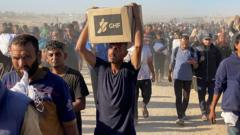Witness accounts and international medical teams reported tragic violence as Israeli forces opened fire on Palestinians seeking aid, prompting major concerns over the new aid system implemented in Gaza by Israel and the US. Critics argue this approach exacerbates the humanitarian crisis, leading to increased dangers for civilians.
Gunfire at Gaza Aid Distribution Site Escalates Calls for Reform in Humanitarian Approach

Gunfire at Gaza Aid Distribution Site Escalates Calls for Reform in Humanitarian Approach
Recent deadly incidents at a new aid distribution center in Gaza have intensified scrutiny of Israel's controversial humanitarian efforts, amid claims of mismanagement and rising civilian casualties.
In the pre-dawn hours on Tuesday, a somber scene unfolded at a newly established aid distribution center in southern Gaza as Israeli troops opened fire on Palestinians converging to collect essential food supplies. Eyewitnesses described the event as "total carnage," starkly contrasting with the Israeli military's assertion that they acted against "suspects" who deviated from designated marked routes. The growing death toll from these encounters is expected to amplify criticisms of Israel's contentious distribution system.
Implemented with U.S. backing, the new aid framework replaces operations previously managed by UN and other experienced international organizations. The Gaza Humanitarian Foundation (GHF), which utilizes armed security contracted by an American firm, oversees these distribution hubs, currently situated in areas of southern Gaza fully controlled by Israeli forces. The initiative emerged following an Israeli blockade that left Gazans facing potential famine, according to the UN's food crisis assessment agency.
Israeli authorities argue that the United Nations has allowed Hamas to exploit aid, while the UN maintains it can account for all distributed support and thus refuses to cooperate with the GHF. Critics highlight significant issues with the GHF system, raising alarms over its viability and humanitarian principles. Recently, GHF head Jake Wood stepped down, citing the inability to uphold humanitarian norms like neutrality and independence.
The former UN aid distribution network managed a wide array of food supply points, whereas the GHF's structure has created chaotic systems where only a few can access lifeline resources. As Palestinians navigate hazardous terrain to claim food rations, reports indicate that distribution has devolved into chaos, favoring those in physically advantageous positions. Compounding the situation, Israeli troops' firing resulted in numerous civilian casualties during these desperate gatherings.
In a prior interview, UN High Commissioner for Human Rights Volker Türk condemned the GHF's operational model, describing it as reflective of a disturbing lack of concern for civilian lives in need of assistance. He stated, "Can you imagine people who have been absolutely desperate for food for almost three months, forced to scramble for provisions in perilous conditions?”
Supporters of the GHF system may argue that it's a necessary compromise providing some food assistance, yet critics assert that it fundamentally serves to control Palestinian civilians. Israeli officials, including Defense Minister Israel Katz, have openly cited the use of aid as leverage in their conflict with Hamas.
As Israel's humanitarian strategies face mounting criticism, key allies, including the UK, France, and Canada, are urging meaningful reform in Israeli methods amid sharp international scrutiny. With increased calls for humanitarian aid access to support over two million Gazans and potential sanctions looming, the crisis beneath the ruins of Gaza grows more pressing by the day.





















